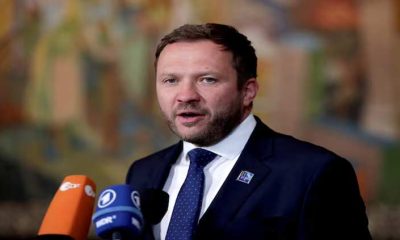The Air Force fighter pilot about to be nominated as the next chairman of the Joint Chiefs of Staff got his callsign by ejecting from a burning F-16 fighter jet high above the Florida Everglades and falling into the watery sludge below.
It was January 1991, and then-Capt. CQ Brown Jr. had just enough time in his parachute above alligator-full wetlands for a thought to pop into his head. “Hope there’s nothing down there,” Brown said in an interview at the Aspen Security Forum last year.
He landed in the muck, which coated his body and got “in his boots and everything.” Which is how the nominee to be the country’s next top military officer got his callsign: “Swamp Thing.”
Brown, now a four-star general and the Air Force chief, will be nominated by President Joe Biden on Thursday. If confirmed, Brown would replace Army Gen. Mark Milley, whose term ends in October. Biden is scheduled to unveil Brown as his pick during a Rose Garden event on Thursday afternoon.
The callsign reveal was a rare inner look into Brown, who keeps his cards close to his chest. He’s spent much of his career being one of the Air Force’s top aviators, one of its few Black pilots and often one of the only African Americans in his squadron.
To this day, his core tenets are to “execute at a high standard, personally and professionally,” Brown said this month at an Air Force Association conference in Colorado. “I do not play for second place. If I’m in, I’m in to win — I do not play to lose.”
He’s been many firsts, including the Air Force’s first Black commander of the Pacific Air Forces, and most recently its first Black chief of staff, making him the first African American to lead any of the military branches.
If confirmed, he would be part of another first — the first time the Pentagon’s top two posts were held by African Americans, with Defense Secretary Lloyd Austin the top civilian leader. Brown would not be the first African American to be chairman, the Pentagon’s top military post; that distinction went to the late Army Gen. Colin Powell.
Brown, 60, has commanded the nation’s air power at all levels. Born in San Antonio, he is from a family of Army soldiers. His grandfather led a segregated Army unit in World War II and his father was an artillery officer and Vietnam War veteran. Brown grew up on several military bases and states, which helped instill in him a sense of mission.
His nomination caps a four-decade military career that spans his commission as a distinguished ROTC graduate from Texas Tech University in 1984 to his White House nomination this week. He was widely viewed within military circles as the frontrunner for the chairmanship, with the right commands and a track record of driving institutional change, attributes seen as needed to push the Pentagon onto a more modern footing to meet China’s rise.
For the past two years Brown has pressed “Accelerate, Change or Lose” within the Air Force. The campaign very much has China in mind, pushing the service to shed legacy warplanes and speed its efforts to counter hypersonics, drones and space weapons, where the military’s lingering Cold War-era inventory does not match up.
In person, Brown is private, thoughtful and deliberate. He is seen as a contrast to Milley, who has remained outspoken throughout his tenure, often to the ire of former President Donald Trump and Republican lawmakers.
“He’s not prone to blurt out something without some serious thought in his own mind, some serious kind of balancing of the opportunities or options,” said retired Air Force Chief of Staff Gen. Michael Moseley, who knows Brown from when Brown worked for him as a member of the Air Staff.
Brown has more than 3,000 flying hours and repeat assignments to the Air Force Weapons School — an elite aerial fighting school similar to the Navy’s TOPGUN. Only about 1% of Air Force fighter pilots are accepted, Moseley said.
When Brown had to eject from the burning F-16 in 1991, after the fuel tank broke off mid-flight, he said the timing couldn’t have been worse.
“I was a bit frustrated because it happened just before the selection for weapons school,” he said at the Aspen forum. He said he had to apply three times before he got in, noting that it’s “pretty competitive.”
But he rose to the top there, too, earning a spot as an instructor, “which is like 1% of the 1%,” Moseley said.
Brown returned to the weapons school as its commandant. By then it had expanded from fighter-only exclusivity to teaching combined airpower operations, with tankers, bombers and cargo planes.
Brown saw that the school “required a different approach and attitude,” said retired Air Force Lt. Gen. Bill Rew. Earlier commandants had tried to institute a new mantra, “Humble, Approachable, Credible,” but it had not taken root.
Under Brown the cultural shift took hold and remains in place today, said Rew, who was one of Brown’s instructors at the weapons school and wing commander during Brown’s time as commandant.
“It takes a certain kind of leadership, that doesn’t force cultural change on people but explains it and motivates them on why that change is important,” Rew said.
In June 2020, Brown was just a week from being confirmed by the Senate to serve as chief of staff of the Air Force when he felt the need to speak out on George Floyd’s murder.
It was risky and inopportune time for the general to draw public attention and pull back the curtain on his private thoughts. But he did so anyway, after discussions with his wife and sons about the murder, which convinced him he needed to say something.
In a June 2020 video message to the service titled “Here’s What I’m Thinking About,” Brown described how he’d pressured himself “to perform error-free” as a pilot and officer his whole life, but still faced bias. He said he’d been questioned about his credentials, even when he wore the same flight suit and wings as every other pilot.
It’s been 30 years since Powell became the first Black chairman, serving from 1989 to 1993. But while African Americans make up 17.2% of the 1.3 million active-duty service members, only 9% of officers are Black, according to a 2021 Defense Department report.
“I’m thinking about my mentors and how I rarely had a mentor that looked like me,” Brown said in the video.
“I’m thinking about how my nomination provides some hope, but also comes with a heavy burden — I can’t fix centuries of racism in our country, nor can I fix decades of discrimination that may have impacted members of our Air Force.
“I’m thinking about how I can make improvements, personally, professionally and institutionally,” so all airmen could excel.
His decision to speak out did not cost him. His Senate confirmation vote was 98-0.
But like the brief moment in Aspen, the personal video message was a rarity. After confirmation, he lowered his public profile again, and got to work.
Post Views: 83


 Sports3 months ago
Sports3 months ago
 Fashion2 months ago
Fashion2 months ago
 Sports3 months ago
Sports3 months ago
 pakistan3 months ago
pakistan3 months ago
 pakistan3 months ago
pakistan3 months ago
 World2 months ago
World2 months ago
 World2 months ago
World2 months ago
 Sports2 months ago
Sports2 months ago




















